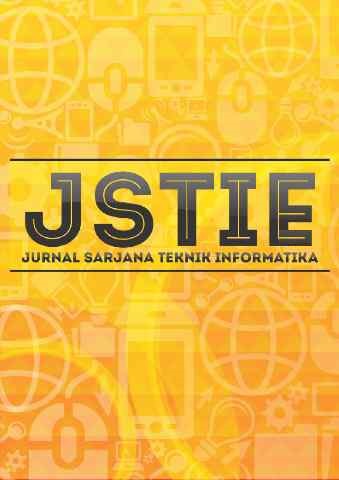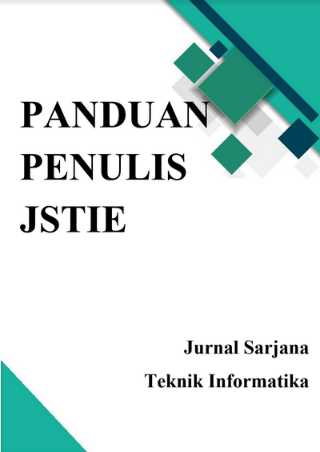Pengembangan Aplikasi Android Sebagai Media Pembelajaran Alat Transportasi
DOI:
https://doi.org/10.12928/jstie.v8i3.18383Keywords:
Pengenalan Alat Transportasi, Media Pembelajaran, Flash, AndroidAbstract
Perkembangan teknologi memudahkan anak-anak untuk menerima berbagai infomasi. Salah satunya perangkat mobile yaitu smartphone Android. Smartphone dapat membantu dalam poses pembelajaran anak-anak. Seperti pengenalan alat transportasi. Mengenalkan anak-anak alat transportasi yang ada disekitar merupakan langkah awal untuk membuat anak-anak mengenal mengenai berbagai hal yang ada disekitar mereka. LKA (Lembar Kerja Anak) yang menjadi media pembelajaran tidak menyantumkan semua jenis alat transportasi. Oleh karena itu, perlu adanya aplikasi media pembelajaran alat transportasi didesain pada smartphone Android. Dengan tujuan dapat memberi kemudahan anak belajar mandiri di rumah dengan didampingi orang tua. Subyek penelitian ini adalah aplikasi pengenalan alat transportasi untuk anak usia dini 3-6 tahun. Metode pengumpulan data dengan metode observasi, wawancara dan studi pustaka. Tahap perancangan aplikasi menggunakan metode research and development meliputi analisis kebutuhan, desain, implementasi, dan pengujian. Dalam pembuatan aplikasi ini menggunakan software adobe flash cs6. Hasil pengujian Black Box yang dilakukan oleh guru mendapatkan hasil 100% menunjukkan bahwa aplikasi sudah sesuai dengan kebutuhan pengguna dan semua fungsi sudah berjalan sesuai kebutuhan fungsional. Pengujian SUS Pemahaman Anak dengan hasil baik (75%), dan Pengujian SUS Ketertarikan Anak dengan hasil baik (73%). jika dibandingkan dengan acuan rata-rata SUS yakni diangka 68%.References
D. Waskito, “Media Pembelajaran Interaktif Matematika Bagi Sekolah Dasar Kelas 6 Berbasis Multimedia,†Speed Journal-Sentra Penelit. Eng. Dan Edukasi, vol. 11, no. 3, pp. 59–65, 2014.
K. Kosasih, “Peranan Organisasi Kemahasiswaan Dalam Pengembangan Civic Skills Mahasiswa,†J. Pendidik. Ilmu Sos., vol. 25, no. 2, pp. 188–198, 2017.
P. R. Indonesia, “Undang-undang Republik Indonesia nomor 20 tahun 2003 tentang sistem pendidikan nasional,†Jakarta Pemerintah Republik Indones., 2003.
H. Nazaruddin Safaat, “Android Pemrograman Aplikasi Mobile Smartphone dan Tablet PC Berbasis Android,†Inform. Bandung, 2011.
R. Rosyidi, “GAME EDUKATIF ANAK USIA DINI BERBASIS MULTIMEDIA DI YAYASAN PAUD HARAPAN BUNDA SEJATI,†Telematika, vol. 4, no. 2, 2011.
K. W. Sari, “Pengembangan game edukasi kimia berbasis role playing game (RPG) pada materi struktur atom sebagai media pembelajaran mandiri untuk siswa kelas X SMA di kabupaten Purworejo,†2014.
L. D. Putra and I. Ishartiwi, “Pengembangan multimedia pembelajaran interaktif mengenal angka dan huruf untuk anak usia dini,†J. Inov. Teknol. Pendidik., vol. 2, no. 2, pp. 169–178, 2015.
Downloads
Published
Issue
Section
License
License and Copyright Agreement
In submitting the manuscript to the journal, the authors certify that:
- They are authorized by their co-authors to enter into these arrangements.
- The work described has not been formally published before, except in the form of an abstract or as part of a published lecture, review, thesis, or overlay journal. Please also carefully read Journal Posting Your Article Policy.
- The work is not under consideration for publication elsewhere.
- The work has been approved by all the author(s) and by the responsible authorities – tacitly or explicitly – of the institutes where the work has been carried out.
- They secure the right to reproduce any material that has already been published or copyrighted elsewhere.
- They agree to the following license and copyright agreement.
Copyright
Authors who publish with Jurnal Sarjana Teknik Informatika agree to the following terms:
- Authors retain copyright and grant the journal right of first publication with the work simultaneously licensed under a Creative Commons Attribution License (CC BY-SA 4.0) that allows others to share the work with an acknowledgement of the work's authorship and initial publication in this journal.
- Authors are able to enter into separate, additional contractual arrangements for the non-exclusive distribution of the journal's published version of the work (e.g., post it to an institutional repository or publish it in a book), with an acknowledgement of its initial publication in this journal.
- Authors are permitted and encouraged to post their work online (e.g., in institutional repositories or on their website) prior to and during the submission process, as it can lead to productive exchanges, as well as earlier and greater citation of published work.








